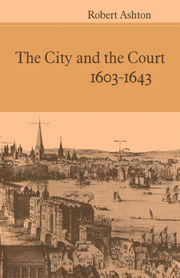Book contents
- Frontmatter
- Contents
- List of tables
- Preface and acknowledgements
- Note on dating, spelling and abbreviations
- Introduction
- 1 Institutions and oligarchy I: the municipal and business élites
- 2 Institutions and oligarchy II: gilds and companies
- 3 Big business and politics under James I
- 4 Big business and politics under Charles I
- 5 The crown and the municipality: local issues
- 6 The municipality and national issues
- 7 Conclusion
- Sources and bibliography
- Index
- Frontmatter
- Contents
- List of tables
- Preface and acknowledgements
- Note on dating, spelling and abbreviations
- Introduction
- 1 Institutions and oligarchy I: the municipal and business élites
- 2 Institutions and oligarchy II: gilds and companies
- 3 Big business and politics under James I
- 4 Big business and politics under Charles I
- 5 The crown and the municipality: local issues
- 6 The municipality and national issues
- 7 Conclusion
- Sources and bibliography
- Index
Summary
On 3 March 1642, nearly six months before the outbreak of the Civil War, King Charles I set out from his capital, to which he was not to return until the end of 1648. Driven from London, as he claimed, by the dangers to himself and the royal family from tumultuous assemblies fomented by his enemies, he was to return a prisoner to face trial and execution. The government of the City which Charles abandoned in 1642 was already falling into the hands of his enemies, even though the events of the preceding months had produced, in London as in England as a whole, serious heart-searchings about the movements which had been set in train by what seemed to many to be dangerously radical programmes of reform in church and state. In the event Charles was deserting a city whose adherence to the cause of his opponents in the Civil War was probably to be the most important single factor in his defeat.
Why was the City of London parliamentarian rather than royalist in the Civil War? From the time of the earl of Clarendon, the first and greatest historian of the Great Rebellion, to that of Valerie Pearl historians have recognized the crucial importance of this question and have offered a variety of different answers to it.
- Type
- Chapter
- Information
- The City and the Court 1603-1643 , pp. 1 - 4Publisher: Cambridge University PressPrint publication year: 1979

